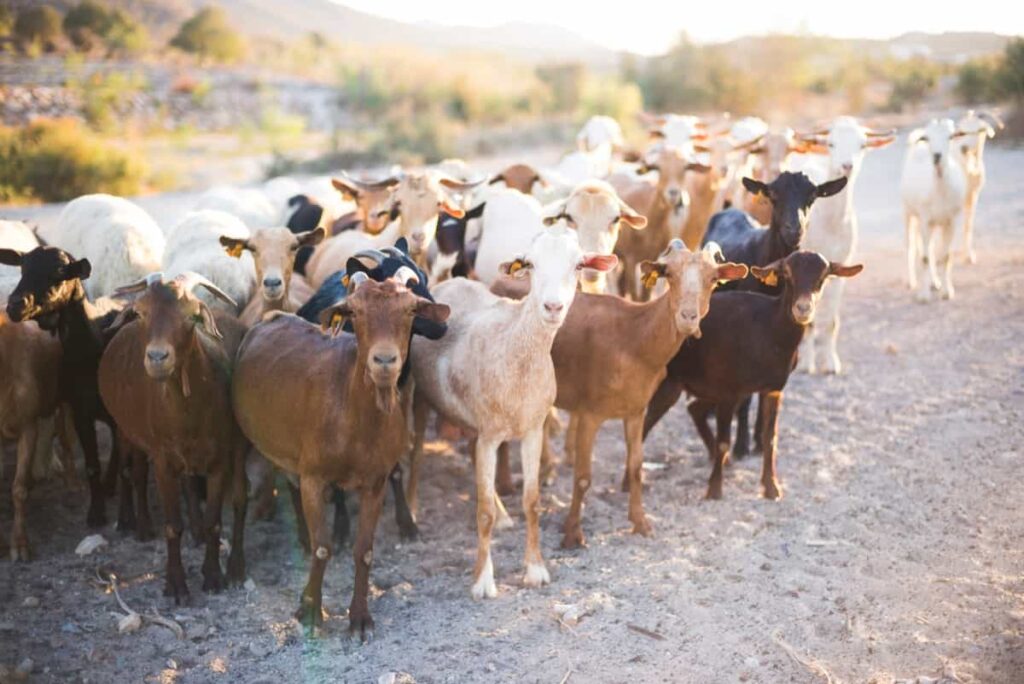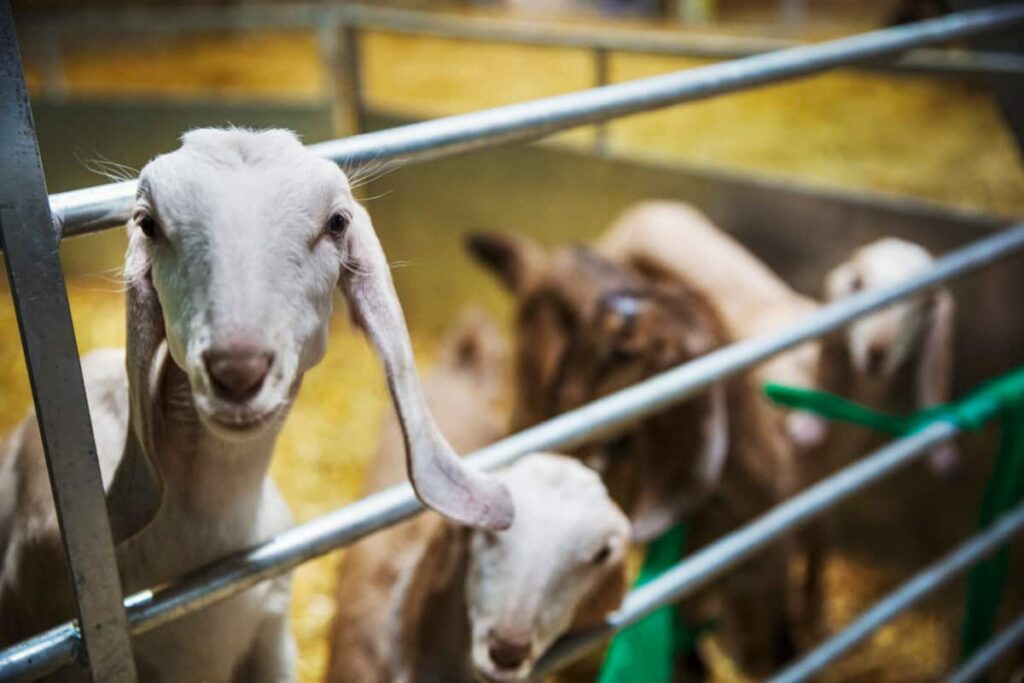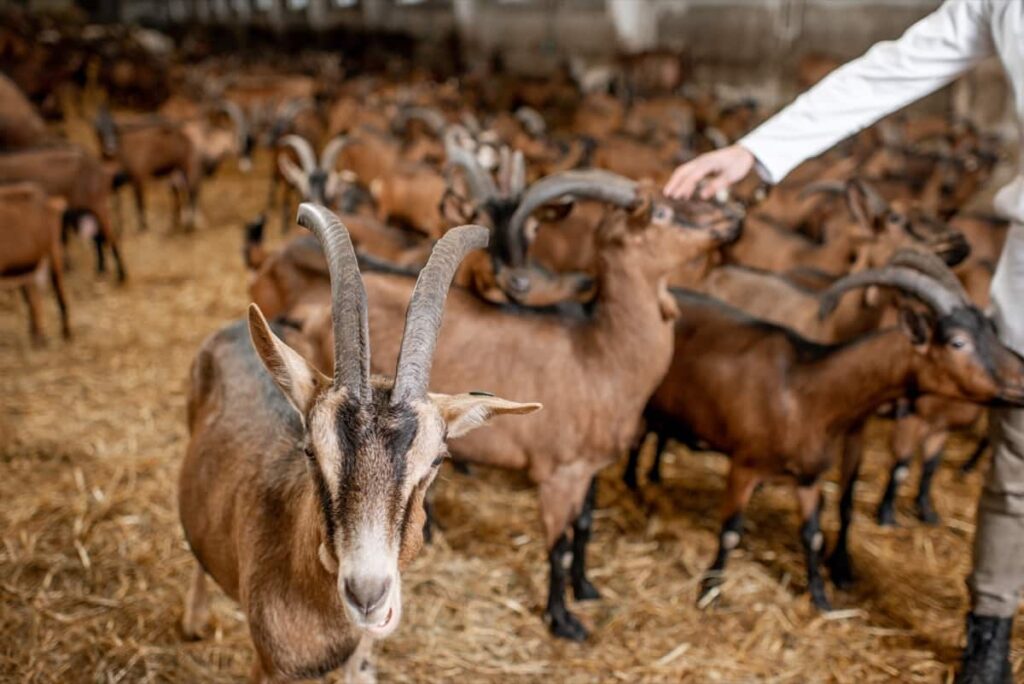Maintaining a healthy herd is critical for the success of any goat farming operation. There are several best practices for disease prevention and management in goats that farmers should implement to maintain the health of their herds. One of the most important strategies is biosecurity, which includes practices such as controlling visitor access and quarantine protocols for regularly cleaning and disinfecting disinfection of equipment and facilities.

Vaccination is also an essential tool in preventing the spread of infectious diseases. Proper nutrition and herd management practices, such as maintaining a clean and dry environment, are also important in preventing disease outbreaks. Early detection and treatment of sick goats are also critical, including isolation and treatment protocols and keeping detailed records of herd health to help identify and prevent disease outbreaks.
Disease Prevention and Management in Goats
Importance of Disease Prevention and Management in Goats
- Diseases can cause significant economic losses due to decreased milk or meat production, treatment costs, and death.
- Prevention is more cost-effective than treatment, so it is important to implement management practices that reduce the risk of disease transmission.
- Proper housing, ventilation, and sanitation can help prevent the spread of infectious diseases.
- Providing clean water, nutritious feed, and adequate space can help keep goats healthy and prevent disease outbreaks.
- Regular veterinary care, including vaccinations and parasite control, can help prevent and control the disease.
- Monitoring for signs of illness and promptly isolating sick animals can prevent the spread of disease to other herd members.
- Proper management of kidding and breeding can reduce the risk of dystocia and other reproductive problems.
- Maintaining good hoof health through proper trimming and management can prevent lameness and foot rot in goats.
Benefits of Maintaining a Healthy Herd
- Increased productivity: Healthy goats are more productive, which means you can get more milk or meat from them. They are also less likely to miss breeding cycles, which can lead to fewer kids being born.
- Lower veterinary costs: Keeping your herd healthy means spending less on veterinary bills. Healthy goats are less likely to get sick or injured and require less medication and treatment.
- Improved animal welfare: A healthy herd is a happier herd. When your goats are healthy, they are less likely to suffer from pain or illness, which means they will be more content and better able to express natural behaviors.
- Reduced risk of disease: When your herd is healthy, you reduce the risk of disease spreading among your goats. This means fewer goats will get sick, and you’ll be able to avoid costly and time-consuming disease management measures.
Common Diseases in Goats
- Pneumonia is a respiratory disease caused by bacteria, viruses, or other pathogens. Symptoms include coughing, fever, difficulty breathing, and nasal discharge. Treatment involves administering antibiotics and providing supportive care, such as warm and dry housing and good nutrition.
- Scours: Scours, or diarrhea, is a common problem in young goats. Pathogens, like bacteria, viruses, and parasites, can cause it. Symptoms include loose or watery stool, dehydration, and lethargy. Treatment involves administering electrolytes to prevent dehydration and antibiotics from treating the underlying infection.
- Footrot: Foot rot in goats is a bacterial infection that affects goats’ hooves. Symptoms include lameness, swelling, and a foul odor. Treatment involves trimming the hooves and administering antibiotics.
- Mastitis: Mastitis is an inflammation in mammary glands caused by bacteria or other pathogens. Symptoms include swelling, pain, heat in the udder, fever, and lethargy. Treatment involves administering antibiotics and providing supportive care, such as milking the udder and providing good nutrition.
- Coccidiosis: Coccidiosis is a parasitic infection that affects the intestinal tract of goats. Symptoms include diarrhea, dehydration, and lethargy. Treatment involves administering antiparasitic medication and providing supportive care, such as electrolytes and good nutrition.
- Anthrax: Anthrax is a bacterial infection that can be transmitted to goats through contaminated soil or feed. Symptoms include fever, difficulty breathing, and sudden death. Treatment involves administering antibiotics and providing supportive care, but prevention is critical through vaccination.
- Enterotoxemia: Enterotoxemia, also known as overeating disease, is caused by Clostridium perfringens. Symptoms include diarrhea, abdominal pain, and sudden death. Treatment involves administering antitoxin and antibiotics, and prevention can be done through vaccination.
In case you missed it: Surviving the Heat: The Impact of Climate Change on Goat Farming

Prevention Strategies for Disease Control in Goat
- Biosecurity measures: Implementing biosecurity measures like controlling access to the farm, keeping the premises clean, and monitoring the movement of people and animals can prevent the introduction and spread of diseases.
- Vaccinations: Vaccinations effectively prevent common goat diseases like clostridial, pneumonia, and tetanus.
- Quarantine: Isolate new animals for at least 30 days before introducing them into the herd. This will help identify and treat any potential diseases they may be carrying.
- Nutrition: Proper nutrition is essential for maintaining the health and immunity of goats. Ensure that the goats have access to a well-balanced diet and clean water.
- Parasite control: Parasites like worms can significantly impact the health of goats. Implement a regular deworming schedule to keep the goats free of parasites.
- Hygiene: Maintaining good hygiene practices like cleaning and disinfecting equipment and facilities can help prevent the spread of diseases.
- Regular health checks: Regular health checks and monitoring can help identify potential health issues early on, allowing prompt treatment.
Management Strategies for Disease in Goat
- Vaccination: Vaccination is one of the important and effective ways to prevent many infectious diseases in goats. Goats should be vaccinated against clostridial diseases, Pasteurella multocida, and Corynebacterium pseudotuberculosis. Consult with a doctor to determine the appropriate vaccination schedule for your goats.
- Biosecurity: Biosecurity measures such as controlling visitors to your farm, quarantining new animals, and practicing good hygiene can help prevent the introduction and spread of diseases among your goats.
- Proper Nutrition: Proper nutrition is crucial in maintaining the overall health of your goats. A balanced diet with adequate vitamins and minerals can help keep your goats healthy and reduce their risk of developing diseases.
- Housing and sanitation: Providing clean and well-ventilated housing for your goats can help prevent the spread of diseases. Regular cleaning and disinfection of their living spaces can also help keep them healthy.
- Regular health checks by a doctor can help identify and treat any health issues in your goats early before they become serious.
In case you missed it: Marketing Trends/Strategies and Opportunities for Goat Products

Conclusion
Implementing effective disease prevention and management strategies such as vaccination, biosecurity measures, proper nutrition, housing and sanitation, and regular health checks can help maintain a healthy herd of goats. Working with a veterinarian to develop a herd health plan is crucial for the success of these strategies.
- Types of Grass Growing for Goat Farm
- How to Train Goats for Milking: A Beginners Guide
- Goat Milking Practices and Equipment: A Beginner’s Guide
- Goat Farming for Fiber: Producing Mohair and Cashmere
- Maximizing Goat Milk Production: Tips for Dairy Goat Farmers
- Goat Farming as a Family Business: Strategies for Success
- Profitable Kenya Goat Breeds for Commercial Dairy and Meat Business
- Unlock the Secrets of Oberhasli Goat: Discover Raising and Management Practices
- Ultimate Guide to Myotonic Goats: Explore Profile to Raising
Nice information